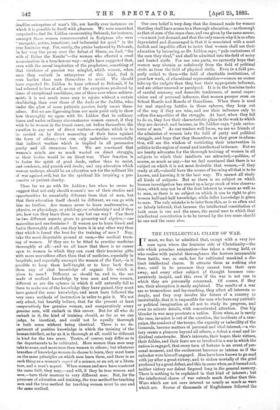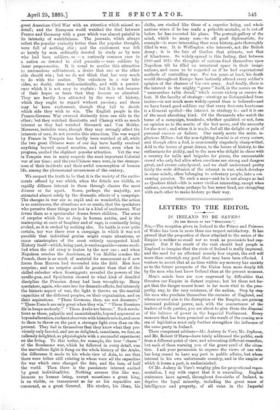THE INTELLECTUAL CHARM OF WAR.
IT must, we fear, be admitted that, except with a very few men upon whom the feminine side of Christianity—the side which preaches resignation—has taken a strong hold, or who realise with painful thoroughness the horrors inseparable from battle, war, as such, has for cultivated mankind a distinct intellectual charm. It attracts them as nothing else does, until in its presence they cannot turn their eyes away, and every other subject of thought becomes comparatively insipid, and this even if the war is not one in which they are personally concerned. Of course, if they are, their absorption is easily explained. The results of a war are so tremendous and far-reaching, they affect all interests so deeply, and they may involve the future of a country so inextricably, that it is impossible for men who have any patriotic or political imagination at all not to study its progress, and even its minute details, with concentrated attention. One big blunder in war may prostrate a nation. Even when, as is rarely the case, invasion is out of the question, the incidents of a campaign, the conduct of the troops, the capacity or imbecility of the Generals, become matters of personal and vital interest,—a victory seems a pleasure beyond all others, a defeat a cruel and individual catastrophe. Men's interests, their hopes, their virtues, their foibles, and their fears are so involved in a war in which the nation is engaged, that every turn of fortune is an event of personal moment, and the excitement becomes as intense as if the onlooker were himself engaged. Men have been known to go mad with joy after a great victory, and to sicken mortally of the grief produced by a great defeat, and this in cases when, as it turned out, neither victory nor defeat lingered long in the general memory. There is nothing to be explained in that kind of interest; but the intellectual charm of war extends much further than this. Wars which are not ours interest us nearly as much as wars which are. Scores of thousands of Englishmen followed the
great American Civil War with an attention which missed no detail; and the European world watched the duel between France and Germany with a gaze which was almost painful in its intensity of watchfulness. The journals, which always reflect the popular curiosity better than the popular thought, were full of nothing else ; and the excitement was felt as keenly by men ordinarily devoted to study as by men who had been soldiers, or — a curiously common case in a nation so devoted to civil pursuits — were soldiers by inner prepossession. It is usual to ascribe this attraction to unconscious self-interest, a desire that one or the other side should win ; but we do not think that has very much to do with the matter. The onlookers in a war take sides, no doubt, often enthusiastically, and with a persistence which it is not easy to explain ; but it is not because of their hopes or fears that they become so absorbed. They are hardly less attracted by the wars of history, which they ought to regard without passion ; and there may be keen excitement, though they fail to decide which side they wish to win. The English people in the Franco-German War swerved distinctly from one side to the other; bat they watched Gambetto. and Chanzy with as much interest as they had watched Bismarck and Von Moltke. Moreover, invisible wars, though they may strongly affect the interests of men, do not exercise this attraction. The war waged by France in Tonquin has hardly been watched at all, while the two great Chinese wars of our day have hardly received anything beyond casual mention, and never, even when in progress, excited the slightest popular attention. Yet the war in Tonqnin was in many respects the most important Colonial war of our time; and the two Chinese wars were, in the strangeness of their incidents and their awful consumption of human life, among the phenomenal occurrences of the century.
We suspect the truth to be that it is the variety of the excitements offered by war which, when the details are visible, so rapidly diffuses interest in them through classes the most diverse or far apart. Some, perhaps the majority, are attracted almost solely by the dramatic effects of a campaign. The changes in war are so rapid and so wonderful, the action is so continuous, the situations are so scenic, that the spectators who perceive these things are lost in a kind of excitement. War fevers them as a spectacular drama fevers children. The sense of surprise which lies so deep in human nattire, and is the mainspring at once of laughter and of rage, is constantly being evoked, as it is evoked by nothing else. No battle is ever quite certain, nor was there ever a campaign in which it was not possible that individual genius might create situations, or cause catastrophes of the most entirely unexpected kind. History itself—which, being past, is unchangeable—seems modified when the old army is beaten by the new one ; and when Napoleon crushes the Austrians, or Von Moltke crushes the French, there is as much of material for amazement as if new forces from Heaven had descended into the field. Men love surprise ; and no surprise could be greater than that of the skilled onlooker when Koeniggratz revealed the powers of the needle-gun, and Speicheren showed to what kind of dreadful discipline the Prussian Army had been wrought-up. Many spectators, again, who care less for dramatic effects, feel intensely the historic aspect of war, the light it throws on the martial capacities of the different peoples, on their organisation, and on their aspirations. "These Germans, then, are not dreamers." "These French are only great when they win." "These Russians die in heaps uselessly." "These Arabs are heroes." Such revelations as these, palpable and unmistakeable, beyond argument as beyond alteration, encha nt observers with historic m i n ds, and seem to them to throw on the past a stronger light even than on the present. They feel in themselves that they know what they previously only fancied, and are as delighted, sometimes, we fear, as callously delighted, as physiologists with a successful experiment on the living. To this writer, for example, the true " charm " of the Sondanese war, which he followed in every detail, was the marvellous light it flung on the whole history of the Arabs, the difference it made to his whole view of Asia, to see that there were tribes still existing in whom were all the capacities for war which once changed the fate, and the face, of half the world. Then there is the passionate interest excited by great individualities. Nothing arouses this like war, because no human being, except sometimes a great king, is so visible, so transparent as far as his capacities are concerned, as a great General. His strokes, his ideas, his shifts, are studied like those of a superior being, and whole nations wince if he has made a palpable mistake, or is out-of before he has executed his plans. The portrait-gallery of the mind, which to many men—to all good diplomatists, for example—is more interesting than even history, gets thoroughly filled in war. It is Wellington who interests, not the British Army ; it is the fate of Gordon that attracts, not that of Khartoum. So widely-spread is this feeling, that between 1800 and 1815 the thoughts of nations fixed themselves upon Napoleon till he filled an unnatural space in their imaginations, and came to be regarded as if he had supernatural methods of controlling war. For ten years at least, his death would throughout Europe have instantly altered every soldier's opinion of the chances of his own army. And finally, there is the interest in the mighty " game " itself, in the moves on the "measureless table dread," which secure victory or ensure defeat. If the faculty of strategy—strategy as distinguished from tactics—is not much more widely-spread than is believed—and we have heard good soldiers say that every first-rate huntsman is a General spoiled—the interest in strategy is ; and it is one of the most absorbing" kind. Of the thousands who watch the turns of a campaign, hundreds, whether qualified or not, form an opinion as to the merits of the last move, and the necessity for the next ; and when it is made, feel all the delight or pain of personal success or failure. One rarely meets the mute, inglorious Milton ; but the non-fighting Jomini is at every corner, and though often a fool, is occasionally singularly sharp-witted. Add to the lovers of great drama, to the lovers of history, to the enthusiasts for ability, and to the men who delight in chess with a country for table and brigades for pieces, the uncountable crowd who only feel alive when emotions are strong and dangers great, and events cataclysmal, and we shall understand pretty fairly the wide diffusion of the interest in war, which develops in some minds, often belonging to sedentary people, into a con suming passion. To such a man—and he is not always as bad as Quakers think—life is never vivid or interesting, except when nations, among whom perhaps he has never lived, are struggling with each other to make history go their way.



































 Previous page
Previous page